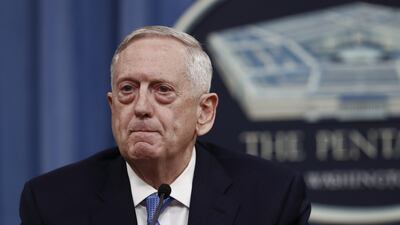ABU DHABI // The US defence secretary will meet with his counterparts in Saudi Arabia, Qatar and Egypt this week to discuss strengthening security cooperation, according to the Pentagon.
Retired general James Mattis will also be in Israel and Djibouti as part of his week-long trip to the region as the Trump administration continues its push to reset Washington’s relations with traditional US partners in the Middle East.
During his tour, Mr Mattis will aim “to re-affirm key US military alliances, to engage with strategic partners in the Middle East and Africa, and to discuss cooperative effort to counter destabilising activities and defeat extremist terror organisations”, the Pentagon said of the trip, which will start in Saudi Arabia on Tuesday.
In February, the former commander of the US military's Central Command made his first trip to the Gulf, and met Sheikh Mohammed bin Zayed, Crown Prince of Abu Dhabi and Deputy Supreme Commander of the Armed Forces in Abu Dhabi. He has maintained good relations with UAE leadership since his time at Centcom, but it was unclear whether UAE officials would be attending the talks in Riyadh.
The Pentagon said Mr Mattis will meet key international counterparts “to strengthen commitments to the US-Saudi security partnership”.
While US-Saudi relations frayed badly under former president Barack Obama, Donald Trump and his national security team have been determined to reaffirm ties with Gulf monarchies and Egypt over shared interests and place much less emphasis on differences such as human rights issues and political reform.
A catalyst for the change is the White House’s shift to a much more combative posture – rhetorically, for now – on Iran and its efforts to spread its influence across the Middle East as it engages in a cold war with arch-rival Riyadh.
Saudi defence minister and deputy crown prince Mohammed Bin Salman met Mr Trump and his senior foreign policy staff during a visit to the White House in February, where they discussed the conflicts in Syria and Yemen.
The main US priority in Yemen is counter-terrorism and cooperation against ISIL and Al Qaeda. The new administration also sees Yemen as a potential theatre for pushing back Iran, via the rebels it supports there.
How Gulf partners can bolster Mr Trump’s strategy to combat ISIL and confront and contain Tehran will likely be at the top of the agenda in Riyadh on Tuesday.
The Obama administration had reduced its intelligence and logistical support to the Saudi-led coalition in Yemen over concerns about civilian casualties and strategy, and had also halted some weapons sales. But Mr Mattis has reportedly asked the White House to lift the restrictions on US support for the coalition’s campaign against Houthi rebels and their allies, and the administration is currently reviewing its Yemen policies, with a decision expected in the coming weeks.
Mr Mattis is also likely to discuss the US administration’s desire for GCC countries to play a larger role in the stabilisation of areas in Iraq and Syria retaken from ISIL, including the possibility of safe zones for civilians in Syria.
“What’s going to be really critical though is what forces can then establish enduring security in those regions that have a legitimacy with the population, that are representative of the population, that can set conditions for reconstruction to begin,” US national security adviser Gen HR McMaster said during an interview with ABC News that aired on Sunday.
On Wednesday, Mr Mattis is scheduled to stop in Egypt for security talks and for a ceremony at Egypt’s Unknown Soldier Memorial. Washington sees Egypt as a crucial security partner in the Middle East, and a key for its attempts to broker a peace deal between Israel and the Palestinians.
Mr Trump has embraced Egypt’s president Abdel Fattah El Sisi, and invited him to the White House last month, after the Obama administration at least symbolically kept him at arm’s length over his policies toward the political opposition in Egypt.
Mr Trump has set aside all of those concerns, and while the White House has not decided to designate the Muslim Brotherhood as a terrorist organisation, as Mr El Sisi had hoped it would, it appears more probable that it will give a green light to military sales financing and other cooperation that Cairo has wanted.
Ahead of Mr Mattis’ visit, an Egyptian court acquitted Egyptian-American aid worker Aya Hijazi, whose release had been advocated by Obama officials and US lawmakers from both parties since her arrest in 2014.
Mr Mattis will also stop in Qatar to “continue efforts to strengthen regional security architectures”, the Pentagon said.
Doha has not had as close ties to the new administration as Abu Dhabi or Riyadh, perhaps due to concerns in Washington over its relationships with Islamist groups, but it is an integral US partner and host to Centcom’s regional headquarters as well as an important player in the Syrian war.
tkhan@thenational.ae

